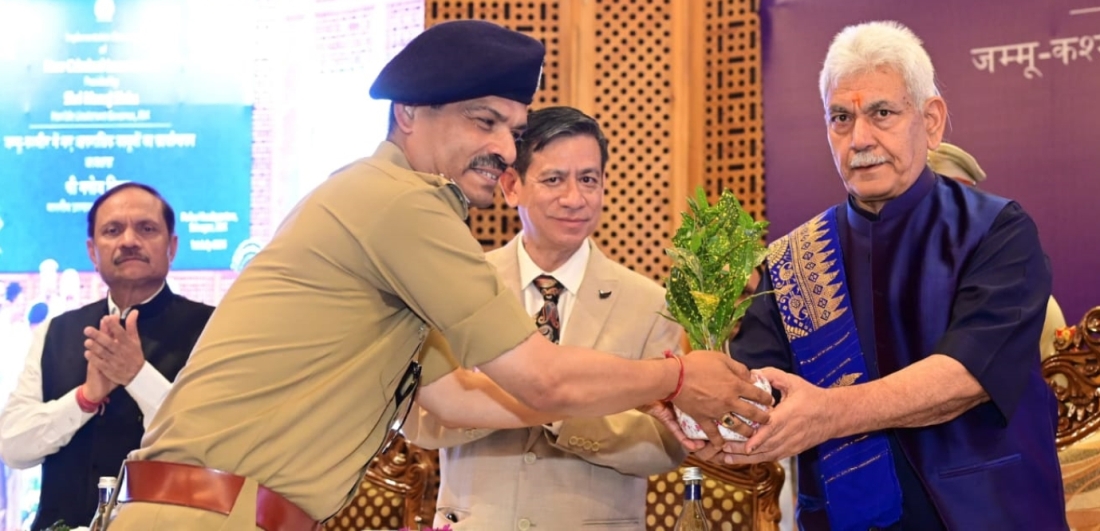SRINAGAR: Jammu and Kashmir Police celebrated Thana Diwas across the Jammu and Kashmir to mark the implementation of three new criminal laws: the Bharatiya Nyaya Sanhita Act, 2023 (BNS), the Bhartiya Nagrik Suraksha Sanhita Act, 2023 (BNSS), and the Bharatiya Sakshya Act, 2023 (BSA), a police spokesman said.

A grand function was held at Police Headquarters, Srinagar, where Lt Governor Manoj Sinha presided over the event as the Chief Guest. Jammu Kashmir and Ladakh High Court N Kotiswar Singh was the Guest of Honour. Chief Secretary Atal Dulloo, Advisor to LG Rajeev Rai Bhatnagar, Director General of Police, RR Swain, and other dignitaries from the judiciary, civil administration, universities, serving and retired Police officers, and media fraternity attended the function.
Twenty-three districts of Jammu and Kashmir, including three police districts, participated in the function through video conference mode. Some of the participants interacted with LG on video conference. The main function and the functions at district headquarters were webcast through the National Informatics Centre (NIC) with the support of the Department of Information Technology.
Concurrently, Jammu and Kashmir Police observed Thana Diwas across all districts, including three police districts, to mark the implementation of the new laws. These events saw participation from Judges, District Magistrate, advocates, senior civil and Police officers, students, representatives of various forums, and citizens.
The spokesman said the participants were informed about the key features and benefits of the three new laws, which are aimed at improving “efficiency, transparency, and accountability” in policing and the criminal justice system. JKP officers reiterated their commitment to ensuring the safety and security of citizens and combating crime effectively. They sought the cooperation of the public in implementing the new laws and maintaining law and order in society.
In his address, LG Sinha expressed gratitude to Prime Minister Narendra Modi and Home Minister Amit Shah for their roles in ushering in these much-needed reforms, according to his spokesman. He emphasised that the commencement of the three new laws—Bharatiya Nyaya Sanhita, Bharatiya Nagarik Suraksha Sanhita, and Bharatiya Sakshya Adhiniyam—marks the end of a colonial legacy and the beginning of a more just and equitable legal system.
These new laws will ensure justice and equality for all, moving away from the repressive colonial framework. The reforms, rooted in the principles of liberty and fraternity, are a testament to our commitment to protect the vulnerable and ensure justice for all,” said Sinha.
Bharatiya Nyaya Sanhita: Replacing the Indian Penal Code of 1860, this law focuses on restorative justice and victim rights. It aims to address the root causes of crime, offering offenders a chance to reform and contribute positively to society, thus shifting the focus from mere punishment to rehabilitation and reintegration.
Bharatiya Nagarik Suraksha Sanhita: This law replaces the Criminal Procedure Code of 1973, ensuring swift and fair trials. It introduces measures to reduce delays in the justice delivery system, emphasizing the protection of the rights of the accused while ensuring public safety.
Bharatiya Sakshya Adhiniyam: Replacing the Indian Evidence Act of 1872, this law modernises evidence collection and usage by incorporating digital documentation and forensic advancements, thus strengthening the credibility of the judicial process.
The LG highlighted the overarching objectives of the new laws, stating that they reflect a major shift towards a more humane and just system, focusing on individual freedom and human rights. The new laws aim to protect victim rights and ensure justice with a focus on human dignity, moving away from punitive colonial measures, he said.
“Designed to protect victim rights and ensure justice with a focus on human dignity, the new laws acknowledge that every individual, regardless of their past, has the potential for change. The emphasis is on repairing the harm caused by criminal behaviour and reintegrating offenders into society,” he said.
Highlighting the new provisions incorporated to suit contemporary times and technologies, Lt Governor Sinha stated that the new laws address issues such as terrorism, sedition, and mob lynching, ensuring a just, humane, and future-ready system. The incorporation of digital tools for evidence collection, case management, and communication enhances the efficiency and transparency of the justice system. However, he underlined the need to remain vigilant about the potential misuse of technology, which could undermine the justice system.
Ensuring data security and protecting the privacy of individuals are paramount, the Lt Governor said. He called for collective efforts to realize the full potential of the new reforms and ensure that justice is served efficiently and equitably. He emphasized the importance of collaboration among all stakeholders in the criminal justice system, including law enforcement agencies, legal professionals, district administration officials, academia, and students.
Chief Justice Justice N Kotiswar Singh, in his address, described the new criminal laws as a reflection of a resurgent and confident India building its destiny based on its rich heritage. He advised university Vice Chancellors present to conduct awareness sessions on the new laws in their respective institutions.
Jammu and Kashmir Lieutenant Governor Manoj Sinha said the three new criminal laws implemented in the country today will ensure justice and equality for all.
“Commencement of three new laws — Bharatiya Nyaya Sanhita, Bharatiya Nagarik Suraksha Sanhita and Bharatiya Sakshya Adhiniyam — break the centuries-old shackles of colonial legacy. These new laws will ensure justice and equality for all, moving away from the repressive colonial framework,” Sinha said at a function held at the Police Headquarters here.
Sinha said the new laws reflect a major shift towards a more humane and just system.
“These laws, based on individual freedom and human rights, reflect a major shift towards a more humane and just system. The reforms, rooted in the principles of liberty and fraternity, are a testament to our commitment to protect the vulnerable and ensure justice for all,” Sinha said.
Highlighting the new provisions incorporated to suit contemporary times and technologies, the Lt Governor said the new criminal laws address the issues like terrorism, sedition and mob lynching, and ensure that our system is just, humane and future-ready.
By incorporating technological advancements, the new laws will enhance the efficiency and transparency of our justice system. This includes the use of digital tools for evidence collection, case management and communication among the five pillars of criminal justice system, Sinha said.
The Lt Governor underlined the need to remain vigilant against the potential misuse of technology, which could undermine the very justice which is being aimed to be upheld. He also spoke on the substantial investment in infrastructure and training required with the integration of forensic technology and digital procedures.
Ensuring data security and protecting the privacy of individuals is paramount. It is imperative to build robust systems that create a firewall against criminals, protect our citizens and foster peace and development, the Lt Governor said.
He emphasised that all the stakeholders of the criminal justice system must nurture new laws collaboratively.
“We embark on a journey towards a more just and fair society. These reforms uphold the rule of law, protect human rights and ensure justice. The major challenge of training our core personnel in all the verticals has been accomplished, including joint trainings.
“The J&K Police has been instrumental in training their core IOs, augmenting the material and human resources and adapting to the technological challenges and working on legal changes. Let’s work together to implement these changes, ensuring trust in a fair, transparent and just legal system,” the Lt Governor said.
Sinha also called for generating awareness on the new laws amongst the citizens, law enforcement agencies, stakeholders, legal fraternity, prosecutors, district administration officials, academia and students.
Others who were present at the implementation ceremony of the new laws included Chief Justice J&K and Ladakh High Court Justice N Kotiswar Singh, Chief Secretary Atal Dulloo and DGP R R Swain.
(With inputs from PTI)














